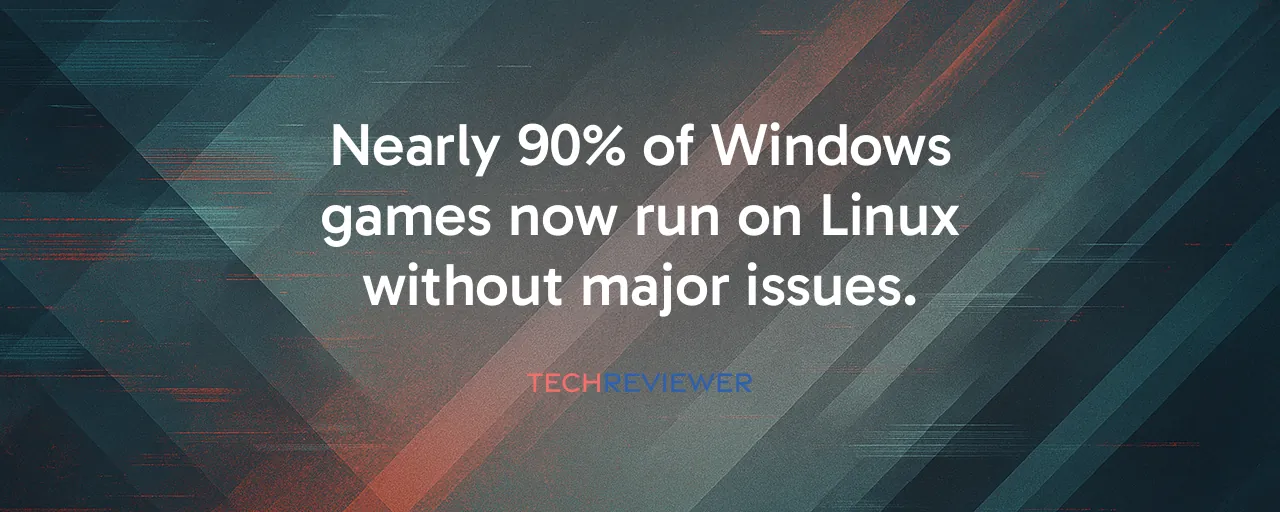Breaking the 90 Percent Barrier
Data from ProtonDB shows a striking shift. Close to nine out of ten Windows games now launch and play on Linux systems without major issues. Boiling Steam pulled together the numbers, highlighting how translation layers like WINE and Valve's Proton turned a longtime weakness into a strength. The community tracks titles in clear categories. Platinum means flawless operation right away. Gold requires small adjustments. Silver games work despite flaws. Bronze sits lower, and Borked covers complete failures.
New releases earn Platinum status more often these days. The share of games that refuse to start has dropped to around 10 percent. This progress builds on years of steady work, with a big push after the Steam Deck arrived in 2022. Valve poured resources into making sure games ran smoothly on their handheld running SteamOS.
Valve and CodeWeavers Lead the Charge
Valve drives much of this effort through Proton, a customized version of WINE. They partnered with CodeWeavers, who handle most WINE contributions. DXVK converts older DirectX calls to Vulkan. VKD3D-Proton manages DirectX 12. These tools redirect instructions rather than emulate, keeping performance close to native levels on the same hardware.
The Steam Deck created real momentum. Over 5.6 million units sold by mid-2025 forced rapid improvements. Valve's Deck Verified list now includes 21,694 playable games. ProtonDB reports at least 15,855 titles with multiple positive ratings. AMD graphics cards often match or exceed Windows speeds in benchmarks, like gaining 9.6 percent in Counter-Strike 2.
Case Study: Apex Legends Blocks Linux Users
Electronic Arts runs Apex Legends. The game worked on Linux through Proton until November 2024. Then an update activated Easy Anti-Cheat in a way that shut out non-Windows systems. EA cited cheating risks, even though the anti-cheat supports Linux when enabled. Players lost access overnight, sparking complaints across forums.
This move shows how publisher choices override technical possibilities. Easy Anti-Cheat can run on Linux, but developers must flip the switch. Many skip it, viewing the user base as too small.
Case Study: Baldur's Gate 3 Succeeds Natively
Larian Studios built Baldur's Gate 3 with Vulkan from the start. The game runs on Linux without Proton at all. Performance stays within a few percent of Windows on identical setups. Players report smooth experiences on desktops and the Steam Deck alike.
Native support eliminates translation overhead. It also avoids anti-cheat conflicts entirely. Titles like this prove Linux handles modern engines well when developers commit early. The game's success demonstrates how Vulkan-native design ensures cross-platform consistency and high performance, setting a benchmark for future RPGs on Linux.
Performance Realities Across Hardware
AMD owners see the best results. An RX 9060 XT card hits 95 percent of Windows frame rates in many games. NVIDIA cards lag further behind, losing 20 to 50 percent in DirectX 12 titles. Driver differences explain most of the gap.
Steam's surveys put Linux users at 2.89 percent in July 2025, up from 1.44 percent in late 2022. Distributions like CachyOS gain ground fast among gamers. Ubuntu's share fell below 8 percent.
Windows 10 End-of-Life Opens Doors
Microsoft ended Windows 10 support on October 14, 2025. Around 240 million devices face upgrade choices. Some gamers eye Linux to avoid Windows 11 requirements or licensing costs. Proton's library makes the switch practical for single-player fans.
Multiplayer remains trickier. Games like Destiny 2 ban Proton users outright. Rockstar disabled Grand Theft Auto V on Linux despite BattlEye offering support that the developer chose not to enable. These blocks stem from policy, not technology, and highlight how developer decisions, not technical limits, often determine access. The end-of-life milestone creates a natural migration window, especially for budget-conscious users and those seeking longer hardware lifespans.
What Comes Next for Linux Gaming
Improvements continue in layers like VKD3D-Proton. New games launch with higher Platinum rates as Valve collaborates with developers pre-release. SteamOS for desktops could standardize experiences further once Valve releases it for general installation.
Market share might climb past 3 percent soon. Handheld makers like Lenovo and ASUS now certify SteamOS compatibility. Still, anti-cheat hurdles could slow progress in competitive scenes if more developers follow EA's lead. NVIDIA driver gains would help broaden appeal, especially as their hardware remains popular among PC gamers despite current performance gaps.
